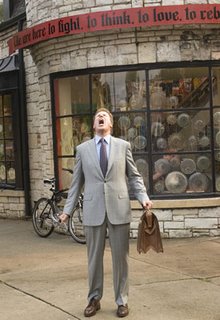Stranger Than Fiction (2006)
 Life imitates art in Marc Forster’s latest film Stranger Than Fiction. It’s very sweet and funny, and deserves a lot more publicity than it has received thus far. Sadly, it was unwisely advertised as a zany comedy. Mr. Ferrell, who is normally all schtick, turns in a very reserved and sophisticated performance that may not appeal to the viewers who come to the theatre expecting Ricky Bobby or Ron Burgundy. I hope that people will give Stranger Than Fiction a chance, however, if only because it is a very intelligent little meta-movie that is neither condescending nor preciously clever.
Life imitates art in Marc Forster’s latest film Stranger Than Fiction. It’s very sweet and funny, and deserves a lot more publicity than it has received thus far. Sadly, it was unwisely advertised as a zany comedy. Mr. Ferrell, who is normally all schtick, turns in a very reserved and sophisticated performance that may not appeal to the viewers who come to the theatre expecting Ricky Bobby or Ron Burgundy. I hope that people will give Stranger Than Fiction a chance, however, if only because it is a very intelligent little meta-movie that is neither condescending nor preciously clever. Will Ferrell plays Harold Crick, a mild-mannered IRS agent with a mundane and lonely life. One day, Harold Crick hears a voice narrating his actions. She knows everything about him, including his thoughts. What he does not know is that the voice is that of Karen Eiffel, a neurotic J.D. Salinger type whose brilliant new novel is supposed to end with his poetic yet violent death. Suprisingly, Harold freaks out a little but insists that he is perfectly sane. Rather than seeking therapy, he decides to seek another authority— English professor Jules Hilbert (Dustin Hoffman).
The basic plot of the film is familiar: a repressed man finds out that he is going to die and decides to live it up while he still has the time. What saves it from being trite, however, is the sheer surrealist idea behind the machinations of his impending doom: he’s in someone else’s novel. The third-person omniscient narrator is his God, and she‘s going to smite him down for the sake of a literary theme. While trying to figure out how to prevent his death, Harold falls in love with Ana (Maggie Gyllenhaal) a Harvard-educated baker with more than a touch of Henry David Thoreau in her.
Mr. Forster, who directed such films as Monster’s Ball. and Finding Neverland, has both a flare for the dramatic and the ability to depict the gravity and tragedy of everyday life. If you think that sounds like an odd match for a comedy, you’re wrong; to the contrary, the dramatic heft behind Stranger Than Fiction is precisely what keeps the audience engaged and the characters sympathetic. Interestingly, Stranger Than Fiction is a film without a villain. Karen Eiffel is not a malicious character, as she does not know that Harold really exists. She wants to end the novel with his death because she always ends her novels with death; in a way, the only villain in this film is unoriginal story telling. Tragedies end with funerals, comedies end with weddings; can Harold escape the “fate” of literary cliché?
The amount of money I would pay to see this movie: $9


1 Comments:
Here's a question for you: who is the antagonist in STF?
Post a Comment
<< Home